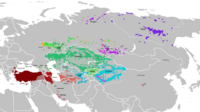| This article needs additional citations for verification. Please help improve this article by adding citations to reliable sources. Unsourced material may be challenged and removed. Find sources: "Pecheneg language" – news · newspapers · books · scholar · JSTOR (March 2015) (Learn how and when to remove this message) |
| Pecheneg | |
|---|---|
| Native to | Pecheneg khanates |
| Region | Central Europe, Eastern Europe |
| Ethnicity | Pechenegs |
| Era | 7th-12th century |
| Language family | Turkic
|
| Language codes | |
| ISO 639-3 | xpc |
| Linguist List | xpc |
| Glottolog | pech1242 |
Pecheneg is an extinct Turkic language spoken by the Pechenegs in Eastern Europe (parts of Southern Ukraine, Southern Russia, Moldova, Romania and Hungary) in the 7th–12th centuries. However, names in this language (Beke, Wochun, Lechk, etc.) are reported from Hatvan until 1290.
Classification
Due to poor documentation and the absence of any descendant languages, linguists have been prevented from making an accurate classification. It is placed as unclassified in the Kipchak language family in Glottolog and in the Kipchak–Cuman language family in Linguist List.
Byzantine princess Anna Komnene asserts that the Pechenegs and Cumans spoke the same language, while Mahmud al-Kashgari considered their language to be a corrupted form of Turkic. Most contemporary researchers conclude that they spoke a Common Turkic language.
References
- "Pecheneg". LINGUIST List. Archived from the original on 13 March 2015. Retrieved 5 June 2024.
7th - 12th centuries AD.
- Wenzel, Gusztáv (1860). "Codex diplomaticus Arpadianus continuatus =: Árpádkori új okmánytár" (in Latin). Harvard University: Eggenberger Ferdinánd Akademiai. p. 108.
- Howorth, Henry Hoyle (1880). History of the Mongols. Burt Franklin. ISBN 9780343146429. Retrieved 15 May 2016.
- Paroń, Aleksander (2021). The Pechenegs : nomads in the political and cultural landscape of Medieval Europe. Thomas Anessi. Leiden. ISBN 978-90-04-44109-5. OCLC 1245959323.
{{cite book}}: CS1 maint: location missing publisher (link)
| Turkic languages | |||||||||||||||||||||||||||||||||||||||||||||
|---|---|---|---|---|---|---|---|---|---|---|---|---|---|---|---|---|---|---|---|---|---|---|---|---|---|---|---|---|---|---|---|---|---|---|---|---|---|---|---|---|---|---|---|---|---|
| Proto-language |  | ||||||||||||||||||||||||||||||||||||||||||||
| Common Turkic |
| ||||||||||||||||||||||||||||||||||||||||||||
| Oghur | |||||||||||||||||||||||||||||||||||||||||||||
| Disputed classification | |||||||||||||||||||||||||||||||||||||||||||||
| Potentially Turkic languages | |||||||||||||||||||||||||||||||||||||||||||||
| Creoles and pidgins | |||||||||||||||||||||||||||||||||||||||||||||
| |||||||||||||||||||||||||||||||||||||||||||||
This article about a Turkic language or related topic is a stub. You can help Misplaced Pages by expanding it. |